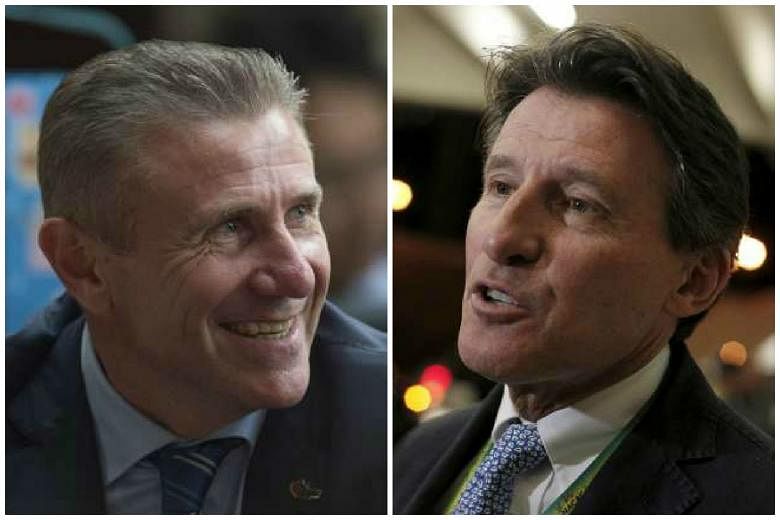BEIJING • Two modern-day legends of track and field will battle to take over the presidency of athletics' world governing body today, in the knowledge that they face a major overhaul to salvage the sport's drug-blighted face.
Either Sergey Bubka or Sebastian Coe will become president of the International Association of Athletics Federations (IAAF) after the body's 214 member federations vote in Beijing, with Senegalese incumbent Lamine Diack, 82, stepping down after 16 years in charge.
Facing the Ukrainian 10-time world pole vault champion and British two-time Olympic 1,500m gold medallist is a monumental task.
The IAAF has in recent weeks been at the centre of allegations of widespread cheating and suspicious blood tests involving hundreds of athletes. The Monaco-based body called the claims "sensationalist and confusing".
The winner also has another big challenge: making athletics sexy again. The sport craves more public and media interest in a world dominated by football and other sports. Track and field might be the biggest Olympic sport but it is a minnow in global sporting financial terms.

Insiders say the race is too close to call, but British world champion runner Mo Farah has put his weight behind countryman Coe.

"You don't want to see anything bad in the sport, but if we all do our best that's all you can do," said Farah, the Olympic, world and European champion in 5,000m and 10,000m. " I hope (Seb) gets that job... he can change athletics."
-
Key points from their manifestos
-
SERGEY BUBKA
• A comprehensive review of the entire sport under his Vision 2025 process if elected.
• Enhance the IAAF's partnership with the International Olympic Committee and "transform athletics for the modern sporting era".
• Protect the integrity of athletics, grow commercial revenue and strengthen the focus on education.
• On doping, he has called for faster and more transparent testing and promised "zero tolerance".
-
SEBASTIAN COE
• Reform the world athletics calendar and introduce more city centre "street athletics" competitions .
• Maximise commercial growth, including new commercial unit to work with long-standing rights holders Dentsu, and focus more on youth engagement.
• Increase resources for anti-doping, including the introduction of a new independent unit, and bring in a new IAAF ethics department to safeguard the values of the sport.
• Reform structure to give athletes a greater voice within the IAAF.
• Make carefully audited payments of US$100,000 (S$140,700) to each member federation over each four-year Olympic cycle to aid grassroots development.
THE GUARDIAN
Bubka, 51, is standing for both the presidency and the vice-presidency, the 58-year-old Coe just the former, having announced he was also willing to step down from his role as an ambassador for US sports equipment company Nike.
The manifestos of the two former stars are not hugely different to the layman, though one major divergence is Coe's insistence that an independent drug-testing body be established. Bubka, who won Olympic gold in 1988, would prefer to continue working with the World Anti-Doping Agency.
Both men have vast experience of sports management and are masters in confidently holding their own in the public domain.
Bubka has been involved with the IAAF since 2001 and has served as vice-president since 2007. He has also been president of Ukraine's National Olympic Committee since 2005 and a member of the International Olympic Committee (IOC) since 1999. He decided, rather ambitiously, to run for IOC president in 2013, but lost to Thomas Bach.
"I'm feeling very good. I'm very confident, I have a lot of support from federations," he said in Beijing yesterday.
Coe has also accomplished much in his life since winning his second 1,500m gold medal in 1984, going on to become a Conservative politician in Britain and overseeing the highly successful London Olympics in 2012.
"I have for a long time known we had two potential candidates, to lead our sport into the future, who would each make good presidents," Diack said ahead of the vote.
"It was for this reason that at the 2007 IAAF elections, I asked two of the four vice-presidents to voluntarily stand down to make room for Seb and Sergey to advance.
"Whoever the IAAF athletics family elects, he will be a bona fide son of our sport."
AGENCE FRANCE-PRESSE, REUTERS

